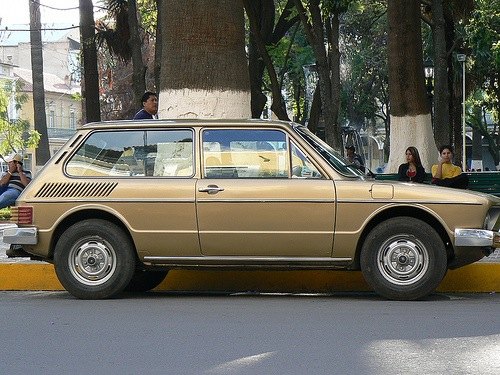Brazilian Truth Commission May Sue Auto Makers For Crimes Against Humanity

João Paulo de Oliveira found it hard to find another job after he was fired by Rapistan, a Michigan-based conveyor belt maker, in 1980. He was detained or arrested another five times until the Brazilian military dictatorship, that had successfully realized a coup d’état in 1964, and returned power to civilians in 1985. Oliveira claims that no other company would hire him after he lost his job, and hge was constantly threatened by police. His crime? Being a union member at a time the military considered strikes as subversive communist movements.
Oliveira declares that he and many other union members suspected that private companies, including many auto makers collaborated with the state’s repressive forces. Apparently, his suspicions have been borne out.
Last Monday, September 8th, the Truth Commission, an organization installed by the federal government as an attempt to investigate human rights violations during those dark years, called the press to clarify and give their position on the rumors and news that have been circulating for days about companies collaborating with the State in its repression of labor movements.
According to the Commission, recently unearthed documents confirm that almost 70 Brazilian and multinational companies acted as “information sources” on union members and workers who were suspected of leading strike movements and of belonging to left-wing organizations. These documents contain name and addresses of the suspects as well as the names of companies that monitored their workers “in order to collaborate with the censorship and repression system during the last years of the civil-military dictatorship” in Brazil.
Sebastião Neto, executive secretary of the work group in charge of investigating collaboration between civilians, companies and military claims that, “Volkswagen, according to the documents, functioned as a sort of intelligence central of that group”. That group included other companies like Brazilian Petrobras, Engesa, Confab and multinationals like Ford and Ericson. They collaborated by keeping tabs on who showed up at union meetings, and exchanged information on worker movements and their plans for strikes and demands on working conditions.
Perhaps the most damning document as it hurt people on a personal level, was one found in the public archive of the state of São Paulo, dated 1981. In it are the names and addresses of some 450 workers and union members and the names of at least 67 companies that gave the information. Among the auto sector companies charged with giving names are Volkswagen, Mercedes Benz, Ford, Chrysler, Scania, Westinghouse, Rolls Royce, Toyota and Toshiba, among other Brazilian corporations.
Lawyer Rosa Cardoso, coordinator of the Commission affirms that, “what happened in Brazil were selective arrests based on information given by companies. Almost 40 percent of those who were dead and disappeared at the time were workers.” According to her, even though the companies were not directly involved in the disappearances, these companies may be accused of crimes against humanity. “Arbitrary and illegal arrests and in places where torture happened are also considered torture in international law”. Such was the case as these illegally detained workers didn’t even have arrest warrants expedited against them.
The lawyer affirms the Commission will present in its final report by December 16. It will include two chapters reporting the persecution of workers and the unions, and the relations between companies and the dictatorship. To help clarify this aspect, Cardoso promises a public hearing where representatives of the companies mentioned in the documents will be called upon to present their testimony.
Being accused as a sort of coordinator of the collaboration between military and companies, Volkswagen has declared that they will conduct their own investigation. According to them, Volkswagen is the only large-scale company in Brazil that, so far, has made a public commitment to “investigate any and all traces” of collaboration between its employees and the military regime. According to a release given to the press, Volkswagen claims they are, “internationally recognized as a company that treats seriously its corporate history”. In Brazil, Volkswagen claims, “the company will deal with this matter in the same way”.
Other companies so far have not commented or have downplayed their responsibility. According to this article, dated Friday, September 5, Mercedes Benz claims that the company “does not confirm” the alleged collaboration and is “non-partisan and zeals for the confidentiality of employees’ data”. Ford has refused to comment. Toyota and Fiat, who now owns Chrysler through FCA, stated they have no registers of the “possible abuse” that occurred back in that time. Toyota, thorough its local Public Relations department wrote, “We would like to remind others that we are discussing something that happened over 30 years ago”.
Reviewing all the information available a cynic might think the Truth Commission is only interested in reparations. A more generous person might believe that people are interested in revisiting the past to point out mistakes and not repeat them in future. The truth probably lies somewhere in the middle and it seems evident that at the time there was a struggle in Brazil between those who wanted to keep the status quo and those who would subvert it. Workers and unions probably helped the re-democratization of the country along, while many in the military and civil society believed such actions were fundamental in thwarting a Communist takeover. Companies may have helped the military out of fear or ideology. It is terrible that people got killed or hurt. In the end, relations between civil society, labor movements and government will be better understood because of the efforts of the Commission and hopefully mistakes, on both parts, will be avoided going forward.

More by Marcelo de Vasconcellos
Latest Car Reviews
Read moreLatest Product Reviews
Read moreRecent Comments
- Slavuta Motor Trend"Although the interior appears more upscale, sit in it a while and you notice the grainy plastics and conventional design. The doors sound tinny, the small strip of buttons in the center stack flexes, and the rear seats are on the firm side (but we dig the ability to recline). Most frustrating were the repeated Apple CarPlay glitches that seemed to slow down the apps running through it."
- Brandon I would vote for my 23 Escape ST-Line with the 2.0L turbo and a normal 8 speed transmission instead of CVT. 250 HP, I average 28 MPG and get much higher on trips and get a nice 13" sync4 touchscreen. It leaves these 2 in my dust literally
- JLGOLDEN When this and Hornet were revealed, I expected BOTH to quickly become best-sellers for their brands. They look great, and seem like interesting and fun alternatives in a crowded market. Alas, ambitious pricing is a bridge too far...
- Zerofoo Modifications are funny things. I like the smoked side marker look - however having seen too many cars with butchered wire harnesses, I don't buy cars with ANY modifications. Pro-tip - put the car back to stock before you try and sell it.
- JLGOLDEN I disagree with the author's comment on the current Murano's "annoying CVT". Murano's CVT does not fake shifts like some CVTs attempt, therefore does not cause shift shock or driveline harshness while fumbling between set ratios. Murano's CVT feels genuinely smooth and lets the (great-sounding V6) engine sing and zing along pleasantly.


































Comments
Join the conversation
Marcelo, why is the Brazilian Truth Commission considering suing auto makers in 2014, 30 or more years after the crimes occurred, as opposed to taking action 10 years ago? I would guess that anyone in a position of power in the early 80s would be retired, possibly dead, by now. Is the goal primarily to extract money from foreign corporations or to expose past misdeeds?
Marcello, I think there might be a word missing in this sentence: "He was detained or arrested another five times until the Brazilian military dictatorship, that had successfully realized a coup d’état in 1964, and returned power to civilians in 1985."